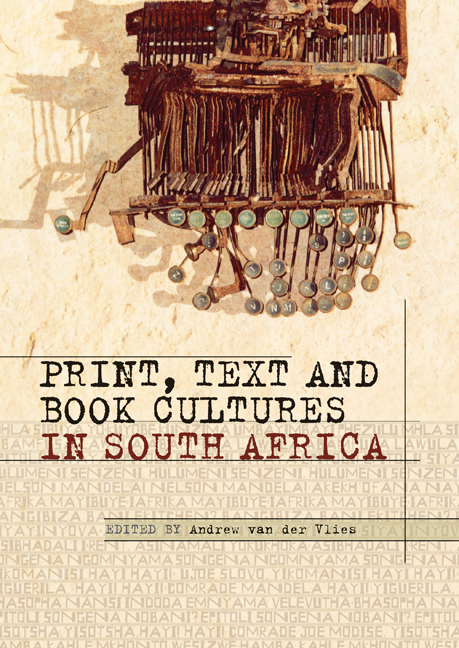Book contents
- Frontmatter
- Contents
- Acknowledgements
- Abbreviations and acronyms
- 1 Introductory
- 2 Print Cultures and Colonial Public Spheres
- 3 Local/Global: South African Writing and Global Imaginaries
- 4 Three Ways of Looking at Coetzee
- 5 Questions of the Archive and the Uses of Books
- 6 Orature, Image, Text
- 7 Ideological Exigencies and the Fates of Books
- 7.1 The Politics of Obscenity: Lady Chatterley's Lover and the Apartheid State
- 7.2 “Deeply Racist, Superior and Patronising”: South African Literature Education and the “Gordimer Incident”
- 7.3 Begging the Questions: Producing Shakespeare for Post-apartheid South African Schools
- 8 New Directions
- Contributors
- Index
7.3 Begging the Questions: Producing Shakespeare for Post-apartheid South African Schools
from 7 - Ideological Exigencies and the Fates of Books
Published online by Cambridge University Press: 21 April 2018
- Frontmatter
- Contents
- Acknowledgements
- Abbreviations and acronyms
- 1 Introductory
- 2 Print Cultures and Colonial Public Spheres
- 3 Local/Global: South African Writing and Global Imaginaries
- 4 Three Ways of Looking at Coetzee
- 5 Questions of the Archive and the Uses of Books
- 6 Orature, Image, Text
- 7 Ideological Exigencies and the Fates of Books
- 7.1 The Politics of Obscenity: Lady Chatterley's Lover and the Apartheid State
- 7.2 “Deeply Racist, Superior and Patronising”: South African Literature Education and the “Gordimer Incident”
- 7.3 Begging the Questions: Producing Shakespeare for Post-apartheid South African Schools
- 8 New Directions
- Contributors
- Index
Summary
“Shakespeare” is a powerful cultural icon. The efficacy of the commodity value of the icon depends in large part on the history of the books through which Shakespeare's texts were transported. The First Folio of 1623 began to consolidate his literary authority. The development of an editorial tradition in the eighteenth century helped to buttress this authority with its scholarly equivalent. Nationalism and colonialism provided the impetus and the tools to grow the legend, and today the Shakespeare industry is a global enterprise that spans education, publishing, theatre, film, television, tourism and other popular cultural incarnations. South African responses to Shakespeare comprise part of this complex historical nexus of materiality, ideology, profit and literary pleasure. The colonial genesis of a South African Shakespeare has been well documented, as part of broader enquiries into literacy in the region by scholars like Leon de Kock (1996; 2001), David Attwell (2005), Deborah Seddon (this volume) and Isabel Hofmeyer (2006). It has been the focus of attention for David Johnson (1996) and myself (Distiller 2005). I have also tracked the recent alterations to the meanings of Shakespeare in South Africa in a post-Thabo Mbeki cultural imaginary (Distiller 2009). Here and elsewhere, Shakespeare occupies the contradictory position of being the most English of figures and the most putatively universal voice of humanity. In the South African context—the context of the overlap of liberalism and white privilege; of the power of English for social advancement since the time of the mission schools; of the increasingly rancorous use of race and its relation to colonial inheritances by an increasingly corrupt political leadership— Shakespeare occupies an uneasy place in the country's cultural and political discourses today.
Through a brief discussion of some of the editions of Shakespeare texts produced for South African schools, I want to raise questions about the meaning of Shakespeare in post-apartheid South African cultural institutions. Since the majority of South Africans who will encounter Shakespeare will do so at school and the majority of the productions staged in any given year will respond to the final year, or Grade 12, English syllabus setwork, my questions relate to the ways in which “Shakespeare” is able to function in the education system: both at a secondary level and in the relationship of work produced in universities to the broader educational—and cultural—context.
- Type
- Chapter
- Information
- Print, Text and Book Cultures in South Africa , pp. 386 - 406Publisher: Wits University PressPrint publication year: 2012



